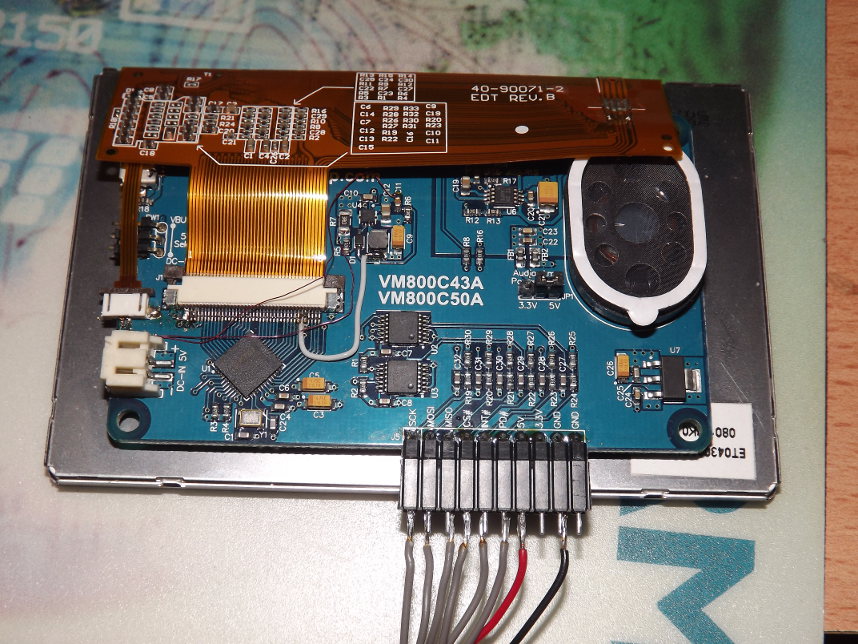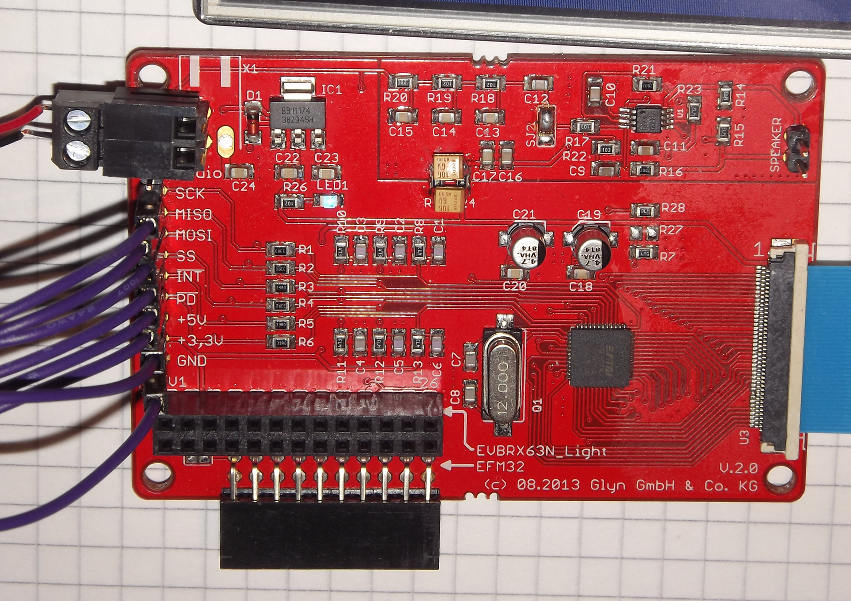Lib for FTDI FT800 graphic controller "EVE" The API is changed from the FTDI original names. It use smaller names now. DL() will add something to the display list instead of Ft_App_WrCoCmd_Buffer ... The FTDI programmer Guide is also using this commands.
Dependents: FT800_RGB_demo FT800_RGB_demo2 FT800_demo_for_habr Temp_&_RH_at_TFT-demo ... more
Fork of FT800 by
The mbed is talking thru the SPI interface with the graphic engine. We have to set up a list of Commands and send them to the FT800 to get graphics.
Hardware
1. VM800C development modules from FTDI : http://www.ftdichip.com/Products/Modules/VM800C.html
The modules come with different size lcd. 3.5", 4.3" or 5" or without.
 The picture shows a modified board, because my lcd had a different pinout. The mbed is connected to the pin header on the bottom.
The picture shows a modified board, because my lcd had a different pinout. The mbed is connected to the pin header on the bottom.
2. EVBEVE-FT800 board from GLYN: http://www.glyn.com/News-Events/Newsletter/Newsletter-2013/October-2013/A-quick-start-for-EVE-Requires-no-basic-knowledge-graphics-sound-and-touch-can-all-be-learned-in-minutes
The module has a 40 pin flex cable connector to connect a display out of the EDT series.

The mbed is connected via the pin header on the left. If you use this board with a EDT display you have to uncomment the #define Inv_Backlite in FT_LCD_Type.h, because the backlight dimming is inverted.
3. ConnectEVE board from MikroElektronika http://www.mikroe.com/add-on-boards/display/connecteve/#headers_10 The board has also a pin header to connect the mbed. - not tested, but it looks like the other boards.
4. ADAM arduino shield http://www.4dsystems.com.au/product/4DLCD_FT843/ Component page : http://mbed.org/components/ADAM/
Works with the NUCLEO boards, but you have to patch three wires.

Connection
We need 5 signals to connect to the mbed. SCK, MOSI and MISO are connected to a SPI channel. SS is the chip select signal and PD work as powerdown. The additional INT signal is not used at the moment. It is possible to generate a interrupt signal, but at the moment you have to poll the status register of the FT800 to see if a command is finished.
Software
This lib is based on the demo code from FTDI. If you want to use it, you have to read the programming manual : http://www.ftdichip.com/Support/Documents/ProgramGuides/FT800%20Programmers%20Guide.pdf
See my demo : http://mbed.org/users/dreschpe/code/FT800_RGB_demo/
FT_Gpu_Hal.h
- Committer:
- dreschpe
- Date:
- 2015-02-10
- Revision:
- 6:16e22c789f7d
- Parent:
- 4:363ec27cdfaa
File content as of revision 6:16e22c789f7d:
/*!
* \file FT_GPU_HAL.h
*
* \author FTDI
* \date 2013.04.24
*
* Copyright 2013 Future Technology Devices International Limited
*
* Project: FT800 or EVE compatible silicon
* File Description:
* This file defines the generic APIs of host access layer for the FT800 or EVE compatible silicon.
* Application shall access FT800 or EVE resources over these APIs. In addition, there are
* some helper functions defined for FT800 coprocessor engine as well as host commands.
* Rivision History:
* ported to mbed by Peter Drescher, DC2PD 2014
*
*/
#ifndef FT_GPU_HAL_H
#define FT_GPU_HAL_H
#include "mbed.h"
#include "FT_DataTypes.h"
typedef enum {
FT_GPU_I2C_MODE = 0,
FT_GPU_SPI_MODE,
FT_GPU_MODE_COUNT,
FT_GPU_MODE_UNKNOWN = FT_GPU_MODE_COUNT
} FT_GPU_HAL_MODE_E;
typedef enum {
OPENED,
READING,
WRITING,
CLOSED,
STATUS_COUNT,
STATUS_ERROR = STATUS_COUNT
} FT_GPU_HAL_STATUS_E;
typedef struct {
ft_uint8_t reserved;
} Ft_Gpu_App_Context_t;
typedef struct {
/* Total number channels for libmpsse */
ft_uint32_t TotalChannelNum;
} Ft_Gpu_HalInit_t;
typedef enum {
FT_GPU_READ = 0,
FT_GPU_WRITE,
} FT_GPU_TRANSFERDIR_T;
typedef struct {
ft_uint32_t length; //IN and OUT
ft_uint32_t address;
ft_uint8_t *buffer;
} Ft_Gpu_App_Transfer_t;
class FT800
{
public:
FT800(PinName mosi,
PinName miso,
PinName sck,
PinName ss,
PinName intr,
PinName pd);
private:
SPI _spi;
DigitalOut _ss;
DigitalOut _pd;
InterruptIn _f800_isr;
public:
/* Global used for buffer optimization */
//Ft_Gpu_Hal_Context_t host,*phost;
Ft_Gpu_App_Context_t app_header;
ft_uint16_t cmd_fifo_wp; //coprocessor fifo write pointer
ft_uint16_t dl_buff_wp; //display command memory write pointer
FT_GPU_HAL_STATUS_E status; //OUT
ft_void_t* hal_handle; //IN/OUT
ft_uint32_t CmdBuffer_Index;
ft_uint32_t DlBuffer_Index;
ft_int16_t DispWidth;
ft_int16_t DispHeight;
ft_int16_t DispHCycle;
ft_int16_t DispHOffset;
ft_int16_t DispHSync0;
ft_int16_t DispHSync1;
ft_int16_t DispVCycle;
ft_int16_t DispVOffset;
ft_int16_t DispVSync0;
ft_int16_t DispVSync1;
ft_uint8_t DispPCLK;
ft_char8_t DispSwizzle;
ft_char8_t DispPCLKPol;
ft_void_t BootupConfig(void);
ft_bool_t Bootup(void);
/*The basic APIs Level 1*/
ft_bool_t Init( );
ft_bool_t Open( );
/*The APIs for reading/writing transfer continuously only with small buffer system*/
ft_void_t StartTransfer(FT_GPU_TRANSFERDIR_T rw,ft_uint32_t addr);
ft_uint8_t Transfer8(ft_uint8_t value);
ft_uint16_t Transfer16(ft_uint16_t value);
ft_uint32_t Transfer32(ft_uint32_t value);
ft_void_t EndTransfer( );
/*Read & Write APIs for both burst and single transfer,depending on buffer size*/
ft_void_t Read(Ft_Gpu_App_Transfer_t *transfer);
ft_void_t Write(Ft_Gpu_App_Transfer_t *transfer);
ft_void_t Close();
ft_void_t DeInit();
/*Helper function APIs Read*/
ft_uint8_t Rd8(ft_uint32_t addr);
ft_uint16_t Rd16(ft_uint32_t addr);
ft_uint32_t Rd32(ft_uint32_t addr);
/*Helper function APIs Write*/
ft_void_t Wr8(ft_uint32_t addr, ft_uint8_t v);
ft_void_t Wr16(ft_uint32_t addr, ft_uint16_t v);
ft_void_t Wr32(ft_uint32_t addr, ft_uint32_t v);
/*******************************************************************************/
/*******************************************************************************/
/*APIs for coprocessor Fifo read/write and space management*/
ft_void_t Updatecmdfifo(ft_uint16_t count);
ft_void_t WrCmd32(ft_uint32_t cmd);
ft_void_t WrCmdBuf(ft_uint8_t *buffer,ft_uint16_t count);
ft_void_t WaitCmdfifo_empty();
ft_void_t ResetCmdFifo();
ft_void_t CheckCmdBuffer(ft_uint16_t count);
ft_void_t ResetDLBuffer();
ft_void_t StartCmdTransfer(FT_GPU_TRANSFERDIR_T rw, ft_uint16_t count);
ft_void_t Powercycle(ft_bool_t up);
/*******************************************************************************/
/*******************************************************************************/
/*APIs for Host Commands*/
typedef enum {
FT_GPU_INTERNAL_OSC = 0x48, //default
FT_GPU_EXTERNAL_OSC = 0x44,
} FT_GPU_PLL_SOURCE_T;
typedef enum {
FT_GPU_PLL_48M = 0x62, //default
FT_GPU_PLL_36M = 0x61,
FT_GPU_PLL_24M = 0x64,
} FT_GPU_PLL_FREQ_T;
typedef enum {
FT_GPU_ACTIVE_M = 0x00,
FT_GPU_STANDBY_M = 0x41,//default
FT_GPU_SLEEP_M = 0x42,
FT_GPU_POWERDOWN_M = 0x50,
} FT_GPU_POWER_MODE_T;
#define FT_GPU_CORE_RESET (0x68)
ft_int32_t hal_strlen(const ft_char8_t *s);
ft_void_t Sleep(ft_uint16_t ms);
ft_void_t ClockSelect(FT_GPU_PLL_SOURCE_T pllsource);
ft_void_t PLL_FreqSelect(FT_GPU_PLL_FREQ_T freq);
ft_void_t PowerModeSwitch(FT_GPU_POWER_MODE_T pwrmode);
ft_void_t CoreReset();
//ft_void_t Ft_Gpu_Hal_StartTransfer( ,FT_GPU_TRANSFERDIR_T rw,ft_uint32_t addr);
ft_void_t WrMem(ft_uint32_t addr, const ft_uint8_t *buffer, ft_uint32_t length);
ft_void_t WrMemFromFlash(ft_uint32_t addr,const ft_prog_uchar8_t *buffer, ft_uint32_t length);
ft_void_t WrCmdBufFromFlash(FT_PROGMEM ft_prog_uchar8_t *buffer,ft_uint16_t count);
ft_void_t RdMem(ft_uint32_t addr, ft_uint8_t *buffer, ft_uint32_t length);
ft_void_t WaitLogo_Finish();
ft_uint8_t TransferString(const ft_char8_t *string);
ft_void_t HostCommand(ft_uint8_t cmd);
ft_int32_t Dec2Ascii(ft_char8_t *pSrc,ft_int32_t value);
ft_void_t Text(ft_int16_t x, ft_int16_t y, ft_int16_t font, ft_uint16_t options, const ft_char8_t* s);
ft_void_t Number(ft_int16_t x, ft_int16_t y, ft_int16_t font, ft_uint16_t options, ft_int32_t n);
ft_void_t LoadIdentity();
ft_void_t Toggle(ft_int16_t x, ft_int16_t y, ft_int16_t w, ft_int16_t font, ft_uint16_t options, ft_uint16_t state, const ft_char8_t* s);
ft_void_t Gauge(ft_int16_t x, ft_int16_t y, ft_int16_t r, ft_uint16_t options, ft_uint16_t major, ft_uint16_t minor, ft_uint16_t val, ft_uint16_t range);
ft_void_t RegRead(ft_uint32_t ptr, ft_uint32_t result);
ft_void_t GetProps(ft_uint32_t ptr, ft_uint32_t w, ft_uint32_t h);
ft_void_t Memcpy(ft_uint32_t dest, ft_uint32_t src, ft_uint32_t num);
ft_void_t Spinner(ft_int16_t x, ft_int16_t y, ft_uint16_t style, ft_uint16_t scale);
ft_void_t BgColor(ft_uint32_t c);
ft_void_t Swap();
ft_void_t Inflate(ft_uint32_t ptr);
ft_void_t Translate(ft_int32_t tx, ft_int32_t ty);
ft_void_t Stop();
ft_void_t Slider(ft_int16_t x, ft_int16_t y, ft_int16_t w, ft_int16_t h, ft_uint16_t options, ft_uint16_t val, ft_uint16_t range);
ft_void_t Interrupt(ft_uint32_t ms);
ft_void_t FgColor(ft_uint32_t c);
ft_void_t Rotate(ft_int32_t a);
ft_void_t Button(ft_int16_t x, ft_int16_t y, ft_int16_t w, ft_int16_t h, ft_int16_t font, ft_uint16_t options, const ft_char8_t* s);
ft_void_t MemWrite(ft_uint32_t ptr, ft_uint32_t num);
ft_void_t Scrollbar(ft_int16_t x, ft_int16_t y, ft_int16_t w, ft_int16_t h, ft_uint16_t options, ft_uint16_t val, ft_uint16_t size, ft_uint16_t range);
ft_void_t GetMatrix(ft_int32_t a, ft_int32_t b, ft_int32_t c, ft_int32_t d, ft_int32_t e, ft_int32_t f);
ft_void_t Sketch(ft_int16_t x, ft_int16_t y, ft_uint16_t w, ft_uint16_t h, ft_uint32_t ptr, ft_uint16_t format);
ft_void_t MemSet(ft_uint32_t ptr, ft_uint32_t value, ft_uint32_t num);
ft_void_t Calibrate(ft_uint32_t result);
ft_void_t SetFont(ft_uint32_t font, ft_uint32_t ptr);
ft_void_t Bitmap_Transform(ft_int32_t x0, ft_int32_t y0, ft_int32_t x1, ft_int32_t y1, ft_int32_t x2, ft_int32_t y2, ft_int32_t tx0, ft_int32_t ty0, ft_int32_t tx1, ft_int32_t ty1, ft_int32_t tx2, ft_int32_t ty2, ft_uint16_t result);
ft_void_t GradColor(ft_uint32_t c);
ft_void_t Append(ft_uint32_t ptr, ft_uint32_t num);
ft_void_t MemZero(ft_uint32_t ptr, ft_uint32_t num);
ft_void_t Scale(ft_int32_t sx, ft_int32_t sy);
ft_void_t Clock(ft_int16_t x, ft_int16_t y, ft_int16_t r, ft_uint16_t options, ft_uint16_t h, ft_uint16_t m, ft_uint16_t s, ft_uint16_t ms);
ft_void_t Gradient(ft_int16_t x0, ft_int16_t y0, ft_uint32_t rgb0, ft_int16_t x1, ft_int16_t y1, ft_uint32_t rgb1);
ft_void_t SetMatrix();
ft_void_t Track(ft_int16_t x, ft_int16_t y, ft_int16_t w, ft_int16_t h, ft_int16_t tag);
ft_void_t GetPtr(ft_uint32_t result);
ft_void_t Progress(ft_int16_t x, ft_int16_t y, ft_int16_t w, ft_int16_t h, ft_uint16_t options, ft_uint16_t val, ft_uint16_t range);
ft_void_t ColdStart();
ft_void_t Keys(ft_int16_t x, ft_int16_t y, ft_int16_t w, ft_int16_t h, ft_int16_t font, ft_uint16_t options, const ft_char8_t* s);
ft_void_t Dial(ft_int16_t x, ft_int16_t y, ft_int16_t r, ft_uint16_t options, ft_uint16_t val);
ft_void_t LoadImage(ft_uint32_t ptr, ft_uint32_t options);
ft_void_t DLstart();
ft_void_t Snapshot(ft_uint32_t ptr);
ft_void_t ScreenSaver();
ft_void_t Memcrc(ft_uint32_t ptr, ft_uint32_t num, ft_uint32_t result);
ft_void_t Logo();
ft_void_t SendCmd( ft_uint32_t cmd);
ft_void_t SendStr( const ft_char8_t *s);
ft_void_t StartFunc( ft_uint16_t count);
ft_void_t EndFunc( ft_uint16_t count);
ft_void_t TouchTransform( ft_int32_t x0, ft_int32_t y0, ft_int32_t x1, ft_int32_t y1, ft_int32_t x2, ft_int32_t y2, ft_int32_t tx0, ft_int32_t ty0, ft_int32_t tx1, ft_int32_t ty1, ft_int32_t tx2, ft_int32_t ty2, ft_uint16_t result);
ft_void_t BitmapTransform( ft_int32_t x0, ft_int32_t y0, ft_int32_t x1, ft_int32_t y1, ft_int32_t x2, ft_int32_t y2, ft_int32_t tx0, ft_int32_t ty0, ft_int32_t tx1, ft_int32_t ty1, ft_int32_t tx2, ft_int32_t ty2, ft_uint16_t result);
ft_void_t MemCrc( ft_uint32_t ptr, ft_uint32_t num, ft_uint32_t result);
ft_uint16_t fifo_Freespace( );
ft_void_t DL(ft_uint32_t cmd);
ft_void_t WrDlCmd_Buffer(ft_uint32_t cmd);
ft_void_t Flush_DL_Buffer();
ft_void_t Flush_Co_Buffer();
ft_void_t fadeout();
ft_void_t fadein();
ft_void_t DLSwap(ft_uint8_t DL_Swap_Type);
ft_void_t Sound_ON();
ft_void_t Sound_OFF();
int Load_jpg(char* filename, ft_int16_t* x_size, ft_int16_t* y_size);
ft_void_t Calibrate();
ft_void_t read_calibrate(ft_uint8_t data[24]);
ft_void_t write_calibrate(ft_uint8_t data[24]);
ft_uint32_t color_rgb(ft_uint8_t red,ft_uint8_t green, ft_uint8_t blue);
ft_uint32_t clear_color_rgb(ft_uint8_t red,ft_uint8_t green, ft_uint8_t blue);
}; // end of class
#endif /*FT_GPU_HAL_H*/

 EVE FT800
EVE FT800
 ADAM
ADAM